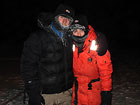

 | |||||||||||||||
|
|
Journals 2007/2008Jason Pavlich
January 1, 2007 Position 70° 59.216' N 123° 31.188' W Everyone expected a light day of work. Brunch was scheduled for 10:30 am so people slept in after a long New Year's Eve party. Our original destination (before we got stuck) was still about 20 miles to the east of our position and we expected to be in for a full day of breaking ice to get there. At the noon science meeting, however, it was announced that the piece of ice we settled into last night would be our station for the foreseeable future. Sampling was to begin immediately. Near-surface current measurements were taken to figure out where to place the sampling sites relative to the ship. Zones on the ice were soon marked for coring, light experiments, snow sampling, and water sampling. By two o'clock, I was dressed and ready to head onto the ice. Wojciech, Monika, Amanda, Debbie, and I loaded two corers, three coolers for surface water samples, an equipment box, and a large wooden box (about the size of small coffin) for core samples into a large metal container. Equipment has to be lowered onto the ice by crane as the gangway leading down to the ice is too steep and narrow to carry the supplies. By 2:30, our equipment was loaded into the komatik (sled) and the snow mobile moved out to our sampling site, about 200 m from the ship.
Three degrees and a little bit of wind made a world of difference. While coring for almost two and a half hours, I had to cover and uncover my face every few minutes. Uncovered, my face would begin to burn from the cold wind and the moisture from my breath would freeze on my beard. Covered, I would soon become overheated from the strenuous physical activity of coring. The ice was hard and deep here- rock solid and 1 meter thick. Back at the ship, the sled was unloaded, equipment hoisted back on deck by the crane, and samples were carried back to the lab. I was physically exhausted when I stepped inside the ship for dinner at 5:15 pm and a hot bowl of carrot soup did me well. After dinner, the corers had to be rinsed down and dried to prevent the salt water from corroding the metal parts. Ice cores had to be taken out of coolers, bagged, labeled, and stored in freezers. Coolers and boxes had to be put back away. Monika and Wojciech began determining the crystal structure of the ice, then cutting the cores into sections accordingly. I was assigned to plankton sorting. I picked up my bucket of critters from the moon pool after the 9:30 pm net tow and sorted plankton until about 11:30. There was much less variation in the species present when compared to the last station. The condition for picking the zooplankton was that it had to be large and alive. Large ensured that it had spent enough time in the environment to pick up any contaminants and alive to make sure it retained the contaminants. When the zooplankton die, they release their oils in which the contaminants accumulate. Small and/or dead samples would give low readings that did not truly indicate the levels of mercury and HCH in this region of the Arctic. Soon after I finished, the ship began to creak and moan. The 20 knot winds were pushing the thick ice up against the ship and snapping it like twigs. It sounded like we were breaking ice, but the Amundsen was going nowhere. The engines started up just after midnight and the boat began to move. I headed up to the bridge to watch since the noise and rumbling would most likely have prevented any meaningful sleep anyway. The captain decided to move the boat to relieve the pressure on the hull. The ice sheet we were on was fractured by the wind and was no longer a safe place to be. For almost 1 and a half hours, we slowly crept through the surrounding ice fields looking for shelter from the flowing ice. Finally we crept into a sheet that had not yet fractured and the ship shut down for the night.
Just as I was about to head back to my cabin, one of the crew pointed out the northern lights that were now visible off the starboard side. I stayed up until 3 am watching the green streaks literally dance across the sky. Sleep is overrated at this point. I only have 9 days left in the Arctic and I have to take advantage of every minute. |
||||||||||||||


